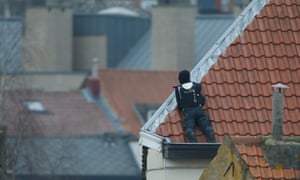An official said the man’s body was found when police stormed an apartment at the centre of the raid where suspects had opened fire on police.
A joint French and Belgian anti-terrorism squad investigating the Paris attacks that killed 130 people had arrived to search an apartment building in the quiet neighbourhood of Forest in the south-west of Brussels at about 2.30pm.
The police came under gunfire from “heavy weapons”, according to the French interior minister Bernard Cazeneuve. Three Belgian police officers were wounded in the initial shootout, with one in a serious condition after being hit in the ear and head according to Belgian media outlets. Another burst of gunfire reportedly took place around two hours later. Further gunfire was heard after 6pm. In total, four officers were wounded in the various shootouts.
During the afternoon, armed French and Belgian police had launched a manhunt in the quiet neighbourhood of Forest as they sought two suspected gunmen who were believed to have gone on the run after opening fire and wounding the officers.

“Two individuals apparently barricaded themselves inside a home,” Forest mayor Marc-Jean Ghyssels told local media.
In the mid-afternoon, a police spokeswoman told French television that gunmen were at large.
Dozens of armed police in balaclavas armed with submachine guns cordoned off the scene. Security services blocked roads and told residents to stay indoors. Two primary schools and creches close to the scene of the shooting were in lockdown until the children could be safely collected by parents. Journalists were asked not to publish videos or photos that identified police officers.
Police cordoned off a wide area and local trams were suspended. The incident took place across the street from an Audi auto factory and the train lines leading to the Gare du Midi railway station where Eurostar trains to London and Thalys trains to Paris run from.
The police cordons raised memories among commentators of the five-days of lock-down imposed on Brussels two weeks after the Paris attacks, when authorities warned of an imminent threat of violence in Brussels during the ongoing manhunt for suspects.
But beyond the wide security cordon, the broader area of Forest attempted to get on with their lives. In early evening, around 50 people had gathered but life carried on as normal. In nearby streets a couple sat in the laundrette and a woman walked her dog.
“It is a very calm peaceful area,” said one 17-year-old, standing in her parents’ shop. “This is a shock for everyone.” Outside television cameras crowded around the police cordon.
“Forest is a calm, peaceful place. I’ve never heard of gunfire in this neighborhood, said Maria, 29, pushing a buggy, as she waited outside the police cordon, unable to visit her mother who lives inside. “Now I am afraid, I am afraid for my little girl.”
The November attacks in Paris are believed to have been in part prepared and coordinated in Brussels.
Abdeslam, believed to have played a key role in organising the Paris attacks, has been on the run since November. He left Paris in the hours after the attacks, shortly after his brother had blown himself up as part of the terrorist assault. Abdeslam fled across the border to Belgium, helped by friends. He is believed to have stayed for a time in Belgium but has not yet been found.
“The operation was not targeting Salah Abdeslam. It was aimed at people connected to one or several of the 11 Belgians who have been charged,” a police source confirmed to AFP. Eight of the 11 people charged are still in detention.
Abdeslam’s associate Mohamed Abrini, who like him grew up in the Molenbeek area of Brussels, is also still at large.
Abdeslam was reportedly holed up in an apartment in the Schaerbeek district in north Brussels for three weeks after the Paris attacks. In January, Belgian authorities said they had found two apartments and a house used by Abdeslam and other suspects in the run up to the attacks.
A fingerprint belonging to Abdeslam was found in the apartment along with traces of explosives, possible suicide belts and a drawing of a person wearing a large belt.
Authorities also found DNA traces from Bilal Hadfi, another of the attackers who blew himself up with a bomb vest near the French national stadium during the November attacks.
The other premises identified were a flat in Charleroi – a town south of Brussels where a major airport is located – as well as a house in the rural village of Auvelais near the French border.







No comments:
Post a Comment
Ashy